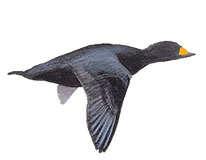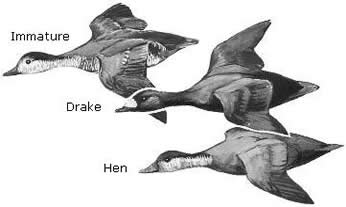Wildlife - Species

Species Specific Regulations
Black Scoter
Licenses: Hunting License required. Migratory Bird Hunting and Conservation Stamp (Federal Duck Stamp) that is validated by the hunter signing the stamp in ink across the face of the stamp
Limits: Please see Migratory Bird Regulations for any game zones restrictions or Limitations.
Black Scoter (Melanitta americana )

Description
Drakes appear all black except for the distinct bright yellow swelling at the base of the upper bill.
Average Size
Black scoters have an average length of 19 1/2 inches and an average weight of 2 1/2 pounds.
Range
The black scoter is found most frequently along the coastal flyways. In South Carolina black scoters are found off the coast during the winter months.
Preferred Habitat
Black scoters prefer shallow lakes during the breeding season. The wintering habitat of these scoters is understudied but appears to be marine habitats along sandy beaches to rocky headlands.
Food Habits
Scoters feed mostly on mollusks, crabs, and some fish and very little vegetation. The diet of scoters in freshwater is mainly aquatic insects and invertebrates, while in salt water it is dominated by mollusks.
Reproduction
Pair bonds form during late fall and winter. Upon return to the breeding grounds the female selects a nest site in areas of tall grass on tundra near water. The nest consists of a depression in the ground lined with grass and down. The female then lays 5-10 off white eggs.
Sound
Drakes make a melodious whistling cour-cour-cour-loo-cour-loo or a long whe-oo-hoo, and hens makes a too-oo-oo it. Most vocal of all scoters.
Behavior
- Male defends moving area around female during the breeding season.
- Ducks feed in flocks of various sizes during the winter months.
Citations, Publications and Literature
U.S. Fish & Wildlife Service, Federal Duck Stamp Office Presents: North American Waterfowl (Adobe PDF file)
Bordage, Daniel and Jean-Pierre L. Savard. 2011. Black Scoter (Melanitta americana), The Birds of North America Online (A. Poole, Ed.). Ithaca: Cornell Lab of Ornithology; Retrieved from the Birds of North America Online
South Carolina waterfowl hunters 16 and older are required by state law to obtain a state migratory waterfowl permit and Migratory Game Bird permit. Both permits must be in the hunter's possession while hunting or transporting legal waterfowl. A state waterfowl permit is included with the Lifetime Senior, Lifetime Gratis and Disability Licenses. S.C. residents who hold a Lifetime Senior or Lifetime Gratis License are not required to have a Migratory Game Bird permit.
National Migratory Bird Harvest Information Program (HIP)
The waterfowl permits and HIP permits are available from select DNR offices and from hunting and fishing license agents.
